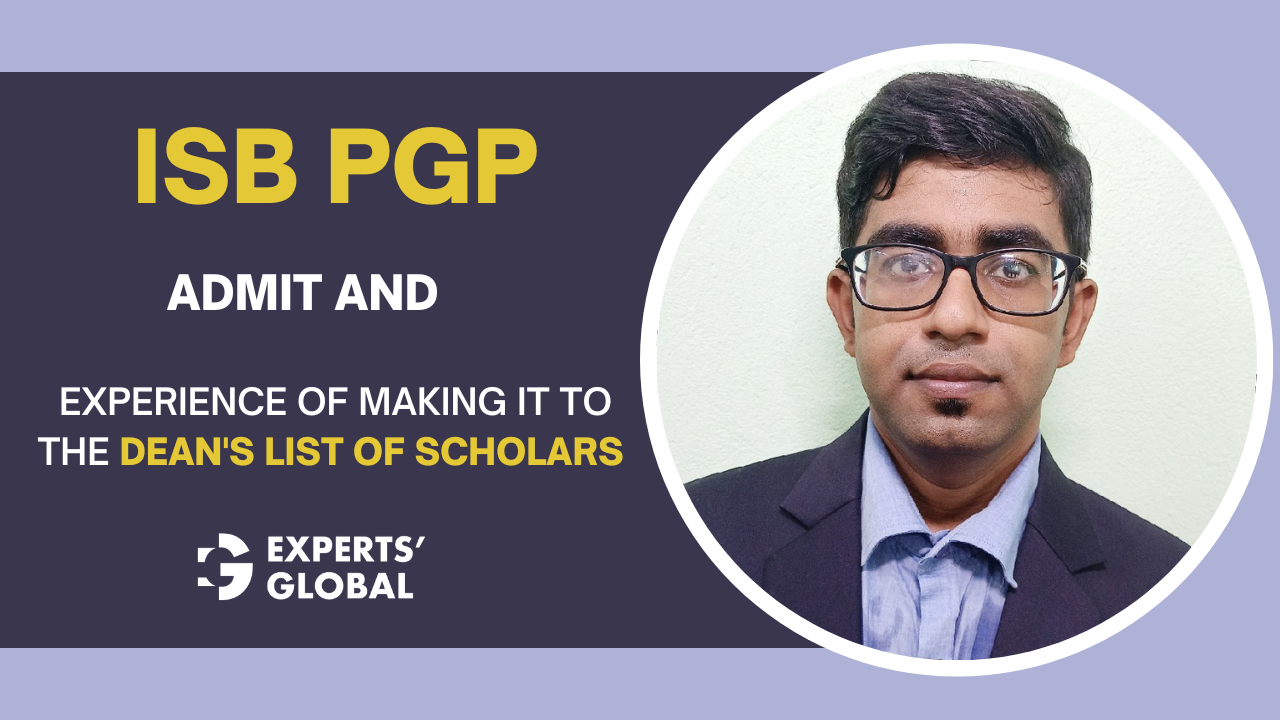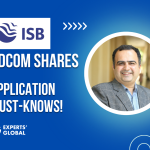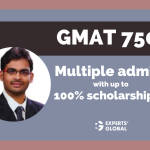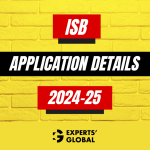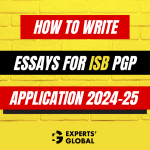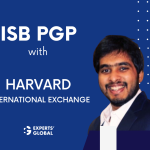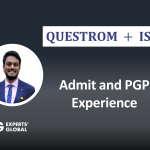Verbatim
Experts’ Global: Hi Manab, thank you so much for interviewing with us today! May we request you to please share your story in your own words?
Manab: Working at Oracle after completing my undergrad, I felt the need for an MBA to improve my career prospects. Looking at the GMAT syllabus, I found that it approached language from a reasoning standpoint, where one’s concepts were to be based on the rules of grammar alone. Given added confidence by this insight, I prepared for the test for three months and ended up scoring a 720.
I then proceeded to select which school would be most appropriate to my ambitions, and settled on ISB. Relying on ISB admissions consultants Experts’ Global to help me make the best of my application, I focused on my overall story rather than my intellectual credentials alone to secure my ISB admission. I graduated fourth in my PGP class with the highest marks in the Finance specialization and spent two years at Deloitte thereafter. I currently work at Accenture as a Management Consultant, having completed a functional transition.
Experts’ Global: In your opinion, what are the actions you took that made all the difference?
Manab: Within the fourteen years of your schooling and the three or four years of your undergrad studies, you should have developed extracurricular interests and hobbies. In my case, my lifelong passion for politics came in handy during my ISB interview, as I was able to project my personality holistically by relying on my prior MBA interview preparation.
Further, I feel like knowing the ins and outs of my post-MBA industry and the function I came from was a definite plus point. Being able to link up my executive vision with a larger message of social service was also a factor that made a difference for me!
Experts’ Global: With the benefit of hindsight, what are some mistakes you made along the way?
Manab: One mistake is not taking the GMAT early in your academic career. Since a GMAT score is valid for five years, you can attempt the test soon after your undergrad is completed. Take a free GMAT practice test to see your level of readiness, study, secure a good score, and then you will have ample time to decide what business schools you are targeting. Take the TOEFL early as well, because doing so will help you ease the way to applying to an international business school.
Make sure that you have in-depth knowledge regarding your functional field, and try and upskill yourself regarding higher-end thought tools in your targeted function. Try and connect with alumni from your targeted school to get an idea of how you can adapt to the MBA culture well.
Experts’ Global: Can you tell us more about your MBA experience?
Manab: The ISB PGP is a one-year program, with a highly rigorous curriculum. The competitive spirit in the class is quite high too, as almost everyone is from a very prestigious college and has great intellectual caliber. I initially found it difficult to keep up with all the extracurricular activities on campus. Over time, I began restricting my attention to those events alone that would provide me an edge in entering a career in consulting. Choosing my electives properly was also a significant step. I learned to assess the syllabus of different courses to assess their fit with my eventual long-term goals.
Further, I had to learn to put my ego aside in group projects and case competitions. I have always been a good statistician and felt that I would naturally take the lead on group work, but this was not always the case. In business school, all your classmates will be exceptional people with leadership skills, and you need to learn to buy into others’ visions and work as a team.
Experts’ Global: Could you share with us your experience with, and advice regarding, the MBA job search?
Manab: The job search aspect of the MBA experience is quite different in India, compared to the rest of the world, due to on-campus placements. I also benefited from the same, as all the good companies in India came to ISB to recruit from its exceptional talent pool.
After term five of your PGP, you will automatically be included in the placement process. You are only allowed to target around fourteen companies out of the hundreds that join placements, and so you need to shortlist your desired job role at a specific company on the basis of feasibility and its suitability for your goals alike.
Experts’ Global: Can you describe your interview experience with ISB?
Manab: My ISB interview experience began with the interview call, five days after which the conversation was scheduled. On the day of the interview, sitting in the waiting room alongside potential candidates who all seemed to be alums of the top IITs in the country, I was very nervous.
When I entered the interview room, the first question thrown at me was how to integrate blockchain with the cloud. Not being an expert in the domains, I answered as best I could. Later on, I asked the interviewer who had asked me the question, also one of my professors at ISB, why he had raised the query. He told me that he wanted to see how I would respond since I did not have a tech or finance background.
Make sure that the figures regarding your completed projects at work are completely accurate, as you could be questioned on them to check your integrity. Be clear about your post-PGP goals and be prepared to justify them if asked to. Use the half-hour span of your interview to its fullest, and pace your answers.
Experts’ Global: What can you share about your lessons from managing the application timeline?
Manab: After securing your targeted GMAT score, you will need at least three months to properly prepare your applications. If you are planning to apply to multiple business schools, I would recommend you talk to MBA admissions consultants as well as alumni from your shortlisted schools to help you refine your application. Seeking expert help will make sure that your application for each business school is tailored to enhance the aspect of your profile that matters most to the said school.
Experts’ Global: How did the entire pre-application experience and the MBA experience contribute to your growth post-MBA?
Manab: My experience has been unique, as I opted for a specialization in finance, strategy, leadership, and public policy, but interned in a consulting role. In the profile, I got to work with multiple banking clients on their respective projects and so understand their processes to my own benefit.
For a candidate such as myself trying to effect a domain change, the lessons of the pre-application process regarding reaching out to alumni for guidance proved quite handy. Further, making sure that I picked the electives and practical immersions that synced with my desire to shift domains was a big plus.
Experts’ Global: What would be your final advice to the GMAT and MBA aspirants out there?
Manab: Try and leverage a GMAT online course to optimize your preparation timeline, use GMAT mocks to identify and shore up your weaknesses, and when you have a good GMAT score, crystalize and focus on your post-MBA vision to guide your application decisions.
Experts’ Global: Thank you so much, Manab, for giving us your time and interviewing with us. We are sure that your valuable suggestions are going to help a lot of future aspirants!
Manab: Thank you as well for this opportunity to help!

